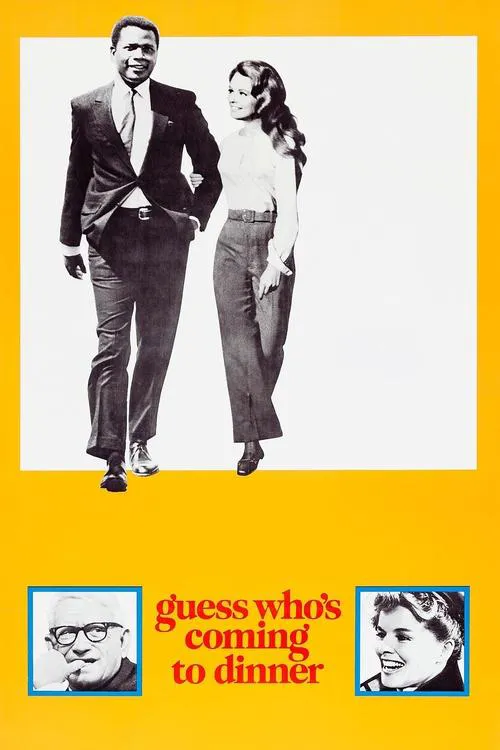Guess Who's Coming to Dinner

Plot
Released in 1967, 'Guess Who's Coming to Dinner' is a groundbreaking romantic comedy-drama film directed by Stanley Kramer. The movie tackles the complex and sensitive topic of interracial marriage in a way that's both thought-provoking and entertaining. The story revolves around Matt Drayton (Spencer Tracy), a liberal newspaper publisher in San Francisco, and his wife Christina (Katharine Hepburn), a high-society woman with philanthropic aspirations. Their daughter, Joanna (Katharine Houghton), a free-spirited and progressive young woman, returns from a trip to Hawaii, where she has met and become enamored with a man named John Prentice (Sidney Poitier), a successful and charming doctor from a prominent African-American family. Upon learning about her daughter's relationship with John, Matt and Christina are shocked and taken aback, having always envisioned a respectable and socially acceptable union for their child. Initially, they struggle to cope with the idea of their daughter marrying a black man, reflecting the prevalent prejudices and stereotypes of the time. As the story unfolds, Joanna is faced with the daunting task of navigating her parents' old-fashioned views and her own desire for independence and love. She is determined to assert her autonomy and make her own decisions, even if they go against the norms of her family and society. John, who is equally determined to prove himself as a worthy partner, is also faced with the daunting challenge of winning over Joanna's parents and dispelling their misconceptions. Through a series of candid and often humorous conversations, Matt and Christina are forced to confront their own biases and prejudices, which are rooted in their upbringing, social status, and the societal norms of the time. As they get to know John, they begin to see him as an individual with his own strengths, weaknesses, and values, rather than as a black man. Their interactions with John's family, who are warm, welcoming, and unapologetically themselves, also serve as a powerful catalyst for their transformation. One of the most significant aspects of 'Guess Who's Coming to Dinner' is its thought-provoking portrayal of the complex issues surrounding interracial relationships. The film does not shy away from exploring the tensions and conflicts that can arise when two people from different backgrounds come together, nor does it sugarcoat the challenges that they face. Instead, it presents a nuanced and realistic portrayal of the ups and downs of relationships, highlighting the importance of communication, understanding, and empathy. The performances in the film are outstanding, with Spencer Tracy and Katharine Hepburn delivering standout performances as Matt and Christina. Their characters' gradual transformation from skepticism to acceptance is both heartwarming and believable, reflecting the depth of their love for each other and their daughter. Sidney Poitier, who was relatively unknown at the time, shines as John Prentice, bringing warmth, humor, and sensitivity to the role. In the end, 'Guess Who's Coming to Dinner' is a powerful exploration of the human condition, urging viewers to look beyond surface-level differences and to treat others with kindness, respect, and empathy. The film's themes of love, acceptance, and understanding are just as relevant today as they were in 1967, making it a timeless classic that continues to resonate with audiences around the world. As the story comes full circle, Joanna's parents are faced with a difficult decision: will they accept John as their son-in-law, or will they let their prejudice get the better of them? Ultimately, they choose the path of acceptance, and the film ends on a hopeful note, as the characters come together in a celebration of love and unity. In the end, 'Guess Who's Coming to Dinner' is a testament to the power of love and acceptance to overcome even the most deeply ingrained biases and prejudices. It is a movie that will continue to captivate and inspire audiences for generations to come, offering a poignant reminder of the importance of empathy, understanding, and acceptance in our complex and ever-changing world.
Reviews
Recommendations




